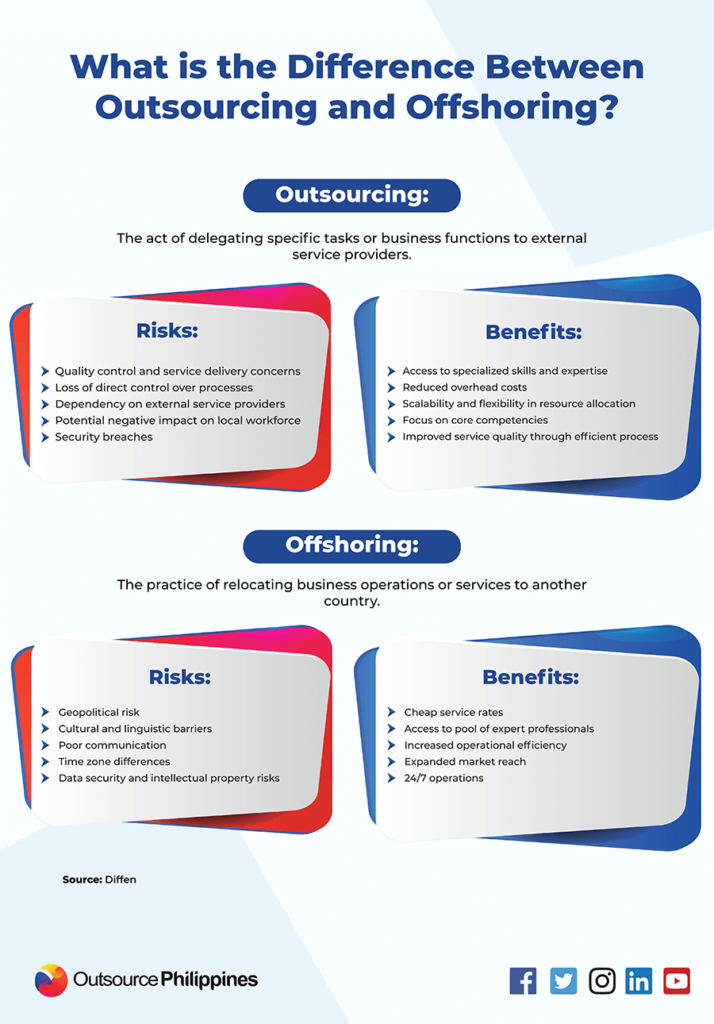In this digital age, business transactions are accessible online. Because of this, it’s easy for companies to hire reinforcements from overseas firms that can boost their business functions. One effective way to do this is through offshore outsourcing.
With consumer demands and a lack of resources, businesspeople rely on offshore outsourcing to ensure that goals are met. Hiring third-party vendors helps improve business processes and increase sales. Nevertheless, its perks aren’t only boxed with those two; it also entails a long list of benefits for startups and established companies.
Just like other things, this kind of outsourcing also has its fair share of downsides. Knowing the two sides of the coin—gains and losses of this business solution—is vital. This is because it enables you to make the most out of this model. That being said; dive in to know more about offshore outsourcing.

What is Offshore Outsourcing?
As mentioned earlier, offshore outsourcing plays a key role in achieving business success. It allows business owners to take advantage of skilled professionals without having to hire in-house staff.
Simply put, offshore outsourcing is a business solution that hires service providers from other countries. These third-party vendors are usually from countries that aren’t in the vicinity of the company that’s outsourcing a service. One of the most sought-after offshore locations is Asia.
In contrast with other outsourcing types, this cost-effective business solution farms skilled professionals beyond borders with cheaper labor costs. This is why BPO companies from the Philippines and India are in high demand.
Aside from affordable service rates, this model allows businesses to cut costs from the employment process. Let’s say that you have a vacant position in your company. Instead of training new employees, you can consider outsourcing. Doing so frees you from the burden and hassle of hiring the best candidate. BPO companies ensure that they’ll partner you with competent specialists.
What is the Difference Between Outsourcing and Offshoring?
Outsourcing and offshoring are sometimes used interchangeably. However, these are two different business concepts. Outsourcing is the process of hiring a service provider that can work on specific business functions.
Offshoring, on the other hand, means hiring third-party vendors from other countries who can provide solutions to business processes. In essence, offshoring is a type of outsourcing, with its key point being geographical proximity.
Outsourcing and offshoring have the same purpose: They are a way of delegating tasks to a team of professionals who have the skills and resources to deliver expected output. Nonetheless, you can outsource to other companies within your business area or choose to offshore from BPO companies overseas.

Offshore Outsourcing: The Pros and Cons
The main goal of any outsourcing method is to make it easier for businesses to achieve their company goals while in-house employees focus on their core responsibilities. Having a lot of tasks on your plate, apart from your main duties, could be challenging and counterproductive. This explains why entrusting the job to qualified outsourcing professionals can help increase productivity and growth. Because of this, companies rely on this business strategy.
If you’re planning on hiring third-party vendors, make sure that you’re aware of offshore outsourcing advantages and disadvantages. This helps you decide whether it’s best for your organization.
Advantages of Offshore Outsourcing
1. Cost-Efficient
The top benefit of offshore outsourcing is cutting costs. As explained earlier, you can save money on hiring, training, and mandatory benefits of employing in-house staff and other operational costs. Plus, the service rates from offshore companies in countries such as the Philippines and India are more affordable than those of hiring onshore agencies.
Related Article:
Achieve Cost-Effective Business through Outsourcing Accounting to the Philippines
2. Competitive Advantage
Aside from cost savings, you also have access to competent professionals who specialize in the field. Hence, you can be at ease that your business functions are in expert hands. Moreover, offshoring enables you to hire a niche-based team of professionals. Because of this, you can expect that you have what it takes to rise above your competitors.
3. Scalability
Being able to adapt to the changing market is crucial for every business, regardless of the industry. This is why it’s important that you’re able to easily ramp up production to address business needs.
Fortunately, this is within reach when you partner with offshore firms. They can efficiently help you meet your demands with their services. Furthermore, it’s easy for them to provide you with a dedicated team of professionals to perform your business functions and deliver your requirements.
4. Customer Support
Availability and efficient customer support play a vital role in the success of businesses. With most transactions being done online, accessibility to your company’s support team can boost customer satisfaction ratings and referrals. Hiring an offshore firm enables you to have a dedicated team who can take inquiries and address issues.
Related Article:
The Benefits and Services of Offshoring in the Philippines
Disadvantages of Offshore Outsourcing
1. Time Zones
The number one factor that sets offshoring apart from other types of outsourcing is that it involves hiring BPO firms from countries that are far from your proximity. You’ll be dealing with third-party agencies from different time zones. This could be a challenge when it comes to coordinating tasks, endorsing deliverables, and scheduling meetings.
2. Cultural Differences
Another disadvantage of this business concept is cultural diversity. You have to do business with companies of different cultures and languages. Cultural differences can be a hindrance because they affect work ethics, business approaches, and decision-making. Therefore, you need to consider cultural compatibility before offshoring.
3. Foreign Regulations
Hiring third-party vendors from another country is easy, but you need to take a closer look at its laws and regulations. Be knowledgeable of the copyright laws of the firm and other legalities. You have to ensure that the agency follows contracts that comply with the laws of the locations of your business and the BPO company.
4. Security Risks
Because you are entrusting your business information and customer data to a service provider, outsourcing, whether onshore, nearshore, or offshore, entails data security risks. Despite that, there are hundreds of trusted and reliable BPO vendors that you can hire. You just have to examine their reputation and performance by checking their clients’ reviews, privacy policies, and terms and conditions.
Related Article:
A Guide to Nearshore Outsourcing: When Geographical Proximity Matters

Offshore Outsourcing Effects on the Economy
Offshore outsourcing is like a double-edged sword, affecting the economies of two countries. It’s no secret that it creates more job opportunities for professionals in the location of the third-party provider. The more services you offshore, the more available jobs there are for the locals in that country. With that, there are fewer job vacancies for domestic employment.
However, economic decline can’t be blamed on offshoring. This is because it’s not all bad, as it provides businesses with benefits that also affect the economy in a good way. This strategic approach of improving business functions results in reallocating budgets in other areas, leading to the strengthening of the industry.
Why Do Businesses Choose Offshoring?
The remarkable perks of offshoring encourage many companies to hire service providers. If you want to see fast results from improved business processes, outsourcing is a wise move for you. Plus, there’s no need to emphasize further that labor costs are lower compared to other means, yet you are assured that you’d be working with expert professionals who can deliver your requirements.
Here’s a quick rundown of reasons companies choose offshoring.
- Labor flexibility
- Pool of globally competitive workforce
- Partnership with international firms
- Penetration of new markets
- Improved operations and services
- Increased productivity
- Enhanced research and development
- Reduced production costs
- Higher return on investment
- Recalibration of business focus
Related Article:
Top Outsourcing Locations in the Philippines Ideal for Your Business
Offshore Outsourcing Philippines: Demand for Philippines Offshoring Services
As stated earlier, one of the top offshoring locations is the Philippines. The country is known for its reputable lists of BPO, KPO, and ITO companies. It has been a reliable and competitive provider alongside India. Moreover, it takes pride in having competent professionals from different industries; many of them have bachelor’s degrees on top of their relevant work experience.
Aside from education and work experience, Filipinos are recognized for proficiency in the English language complemented with good communication skills. Their multicultural background has made them compatible with companies such as the United States. Their high-level of competence plus their work ethics are the top factors that help them become the best. Because of this, it’s no surprise many companies choose to offshore from the Philippines.
Offshore Outsourcing from Outsource-Philippines Delivers Business Results
Being able to reach this section says a lot about your interest in offshore outsourcing. Indeed, it boosts your way to the top of the game. With offshoring, you can focus on your core responsibilities while your in-house staff can also do the same which leads to productivity. It helps you to have better business functions, resulting in achieving business goals.
Business success can be achieved when you partner with the right service provider. Fortunately, you don’t have to look further because we have the best team for you. Outsource-Philippines is home to expert professionals who can handle your tasks. Also, we offer various services that can get you the results that you need.
What are you waiting for? Realize your business goals with our outsourcing services. Partner with us today.









